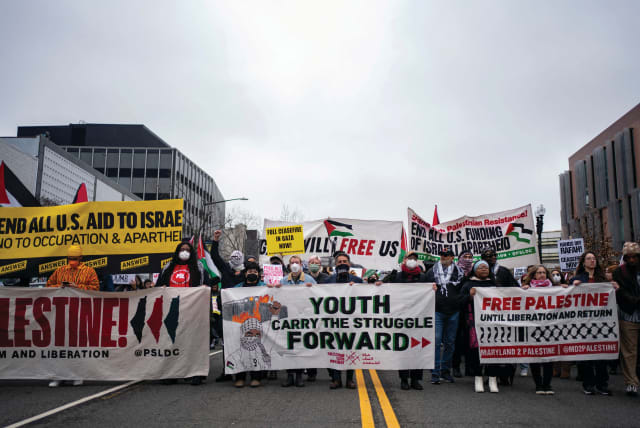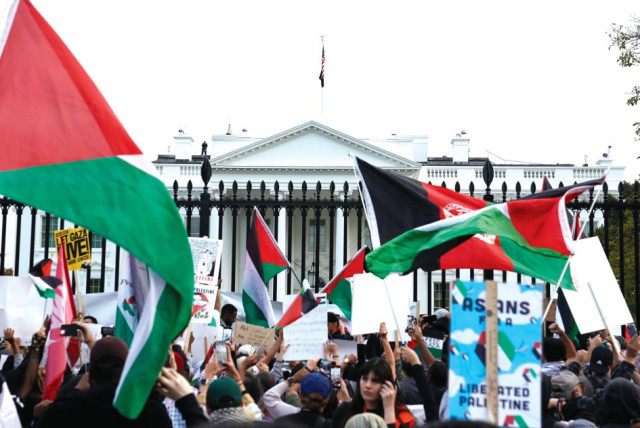US national strategy to combat antisemitism needs a boost - opinion

ON MY MIND The White House called its strategy, issued in May 2023, “the most comprehensive and ambitious US government effort to counter antisemitism in American history.”
Most Americans are unaware of the comprehensive White House plan to combat antisemitism in the United States. Only 17% of American Jews and 12% of the US general public have heard about the National Strategy to Counter Antisemitism, according to the latest American Jewish Committee (AJC) State of Antisemitism in the United States report. Only 56% of both Jewish and general adults have heard nothing at all about the initiative, while 27% of Jews and 33% of the general public have not heard much.
The White House called its strategy, issued in May 2023, “the most comprehensive and ambitious US government effort to counter antisemitism in American history.” The 62-page plan was produced in five months, after consultations with AJC and other national Jewish organizations that had long advocated for a comprehensive whole of society approach to assertively confront continually rising domestic antisemitism.
The National Strategy is facing its first stress test. Nearly two-thirds of American Jews, 63%, say the status of Jews in the US is less secure than a year ago. That’s a distressing finding, especially when compared to the 41% who said the same in 2022 and 31% in 2021.
The AJC surveys, conducted from October 17 to November 21, 2023, reflected the impact of the October 7 Hamas attack in Israel and immediate surge in antisemitism across the US. Of the 63% who say the status of Jews in the US is less secure than a year ago, 28% said it was due to the Israel-Hamas war, while 18% credited the rise in antisemitic attacks, crimes or violence, and 17% stated antisemitism and racism are more overt and accepted.
Intensified feelings of vulnerability are reflected in the numbers who have changed their behaviors in the past year to conceal their Jewish identity. There were 46% of respondents in the new survey, compared to 38% in 2022, have avoided wearing Jewish symbols, or going to certain places or posting content online. Those avoiding certain places, events or situations jumped to 26% from 16% the year before.
“Online antisemitism remains the biggest problem. It’s where Jews experience antisemitism the most,” Holly Huffnagle, AJC’s US director of combating antisemitism, said during a February AJC webinar. There were 62% of US Jews reported seeing or hearing antisemitic content online or on social media over the past year, and 30% avoided posting content online that might reveal their Jewish identity. In addition, 22% of those who saw or heard antisemitism online said they felt physically threatened by those online incidents.
In AJC’s first annual survey of the general public on antisemitism in America, in 2020, only 53% had heard of the term “antisemitism” and knew what it means. Another 21% percent said they had never heard the term and 25% said they heard it but were unsure what it means. Today, Americans generally are more familiar with the word. Now, 70% have heard of “antisemitism” and know what it means, while 20% have heard the term but are unsure of its meaning, while 10% have never heard of it.
Cognizance of antisemitism also is reflected in the 74% of US adults who say antisemitism is a problem in America, an important increase over the 60% who said the same in 2021, and 68% in 2022. Further, those who consider antisemitism in the US a very serious problem rose markedly from 22% in 2022 to 34% in 2023.
These trends suggest openness among Americans generally to embracing a national plan to combat antisemitism and helping in its implementation. A whole of society approach to combating domestic antisemitism should involve all races and faiths in the diverse US population, united in recognizing that hate targeting Jews affects all Americans.
Majority of American Jews say antisemitism in US is a problem
For the most part, Jewish organizations that advocated for the National Strategy and hailed its introduction nine months ago have been its primary promoter, and for good reasons. The fifth annual AJC survey of American Jews on their experiences with antisemitism in the US found 93% saying antisemitism in America is a problem. The share who considers antisemitism a very serious problem rose to 53% in 2023 from 43% in 2022. Further, 86% say antisemitism in America has increased over the past five years, with 50% saying it has increased a lot.
Still, the disconnect between recognition among Americans that antisemitism is a growing problem in the US and awareness of the Administration’s National Strategy is concerning. Potentially significant support is awaiting if more individuals know about the existence and breadth of the White House plan. The National Strategy emphasizes at the beginning that antisemitism has become increasingly “normalized” in American society. It contains, with deadlines, actions federal agencies are compelled to complete by May 2024, with specific calls to action for Congress, state and local authorities, civil society, community and faith leaders, the private sector and individual citizens.
The AJC surveys found 95% of Jews and 92% of the general public agree antisemitism affects society as a whole and that all Americans, not just Jews, are responsible for combating it.
To ensure the continued prioritization of combating domestic antisemitism, the Administration should create a senior level position to coordinate the full implementation of the National Strategy, to keep the public apprised of progress with regular updates, and ensure that this important initiative is sustained by whoever is president in years ahead.
The US has made substantial progress in addressing antisemitism internationally. In 2004, Congress created the position of Special Envoy to Monitor and Combat Antisemitism in the State Department to encourage governments around the world to confront antisemitism in their countries and regions.
Establishing a position to similarly and urgently deal with domestic antisemitism will give another needed boost to promoting the National Strategy.
The writer was the American Jewish Committee’s director of media relations,1998-2023.
Jerusalem Post Store
`; document.getElementById("linkPremium").innerHTML = cont; var divWithLink = document.getElementById("premium-link"); if (divWithLink !== null && divWithLink !== 'undefined') { divWithLink.style.border = "solid 1px #cb0f3e"; divWithLink.style.textAlign = "center"; divWithLink.style.marginBottom = "15px"; divWithLink.style.marginTop = "15px"; divWithLink.style.width = "100%"; divWithLink.style.backgroundColor = "#122952"; divWithLink.style.color = "#ffffff"; divWithLink.style.lineHeight = "1.5"; } } (function (v, i) { });

